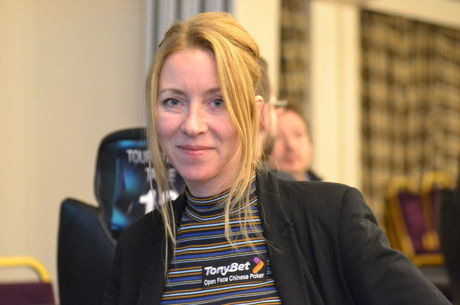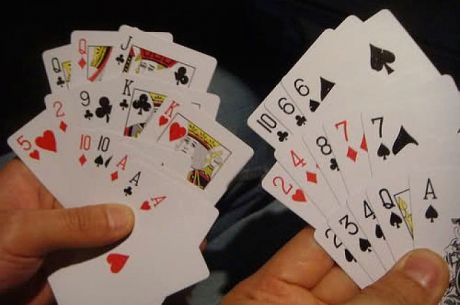20 Rounds Part II: Yakovenko's Step-by-Step Strategy Guide for Pineapple OFC Poker

Open Face Chinese has become one of the most popular games in poker. Top pros like Jason Mercier, Barry Greenstein and Shaun Deeb have become unofficial ambassadors for the game, while dozens of other pros can be found playing the game either late into the night or on their tablets. One of those players is Nikolai Yakovenko, who helped create the ABC Open Face Chinese Poker iPhone app.
Yakovenko, also known as "Googles," is originally from Moscow, Russia and is now a poker player and software developer that resides in Brooklyn, New York. After several years at Google New York working on ranking algorithms, he's been developing independent software projects ever since while making both World Series of Poker and World Poker Tour final tables. Here Yakovenko, who has $313,598 in WSOP earnings, walks you through 20 rounds of Pineapple OFC (which he actually played) and offers strategy and his thought processes throughout. This is the second in a series of articles that will run every Tuesday and Thursday on PokerNews
To check out the first three rounds of the match �� during which time Yakovenko both goes to and defends against Fantasyland �� be sure to check out Part I of the series. That is also where you'll get a primer on the format of the articles.
For more on Yakovenko, check out the recent in-depth interview he did with PokerNews.
Round 638 (button) �C Sneaky, sneaky
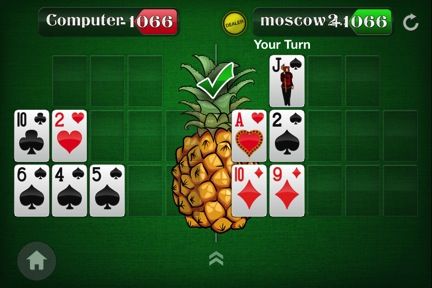
It��s almost a great starting hand if only that jack could be the queen of spades.
1. /10?2?/6?4?5?, J?/A?2?/10?9?
The two-card straight flush on the bottom is always a nice way to start in Pineapple. The hand has maximum upside, and maximum flex, as it can be improved by so many different kinds of draws.
I��d go as far as to call the two-card, no-gap, fully-live straight flush hand the ��stem cell�� of Pineapple OFC. Those two magical cards can become any hand in the deck. The only problem is those cells will have to differentiate themselves pretty quickly.
No tears. No take-backs.
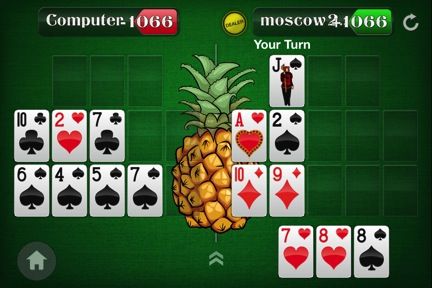
1. /10?2?/6?4?5?, J?/A?2?/10?9?
2. /10?2?(7?)/6?4?5?(7?)/[?], J?/A?2?/10?9?/7?8?8?
With only three rounds of draws after this one, we can��t wait for the straight flush. Two of these cards need to go on the bottom. The middle should be saved for a live ace.
This looks a bit tough, but really it��s not. Playing a pair on the bottom makes us more likely to catch two pair or better, but the open-ended straight is still pretty live, and while the jack looks like a card we need in two places, we actually never really want to pair the jack on top.
With all kings and queens live, as well as all aces, we need to save the top for maximum upside. The jack on top is a good kicker. That��s all it really is.
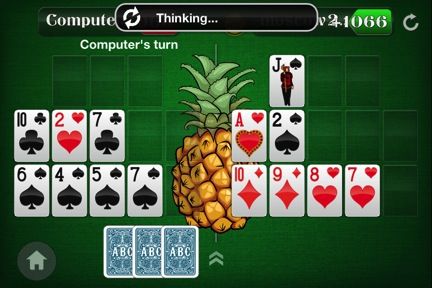
1. /10?2?/6?4?5?, J?/A?2?/10?9?
2. /10?2?(7?)/6?4?5?(7?)/[?], J?/A?2?/10?9?(7?8?)/8?
This is one of the few times I like to play the Pineapple hidden information game. Hiding that 8? from our opponent could make the difference between him (correctly) backing off to a flush or a straight. He'd be holding out for a massive bonus on a straight flush that��s 50% less live than he thinks it is.
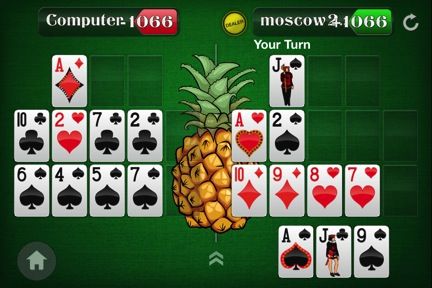
The computer pulls a nice draw, but we get a perfect draw, and another opportunity to hide one of his few remaining spades.
1. /10?2?/6?4?5?, J?/A?2?/10?9?
2. /10?2?(7?)/6?4?5?(7?)/[?], J?/A?2?/10?9?(7?8?)/8?
3. (A?)/10?2?7?(2?)/6?4?5?7?/[?], J?/A?2?(A?)/10?9?7?8?(J?)/9?
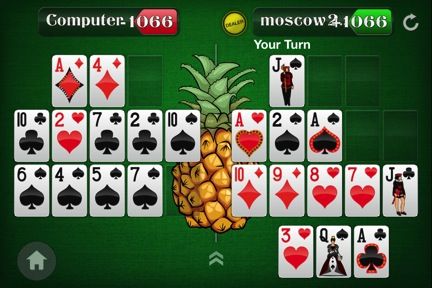
1. /10?2?/6?4?5?, J?/A?2?/10?9?
2. /10?2?(7?)/6?4?5?(7?)/[?], J?/A?2?/10?9?(7?8?)/8?
3. (A?)/10?2?7?(2?)/6?4?5?7?/[?], J?/A?2?(A?)/10?9?7?8?(J?)/9?
4. A?(4?)/10?2?7?2?(10?)/6?4?5?7?/[?], J?/A?2?A?/10?9?7?8?J?/3?Q?A?
This one just isn��t fair. Sure, KxKx would have been better, but shutting down the computer��s ability to go to Fantasyland, improving our own hand, and taking yet another one of his spades, well that��s pretty good.
The 3? is still out there for the computer, but otherwise we have nothing to fear from his hand. And we are freerolling for Fantasyland.
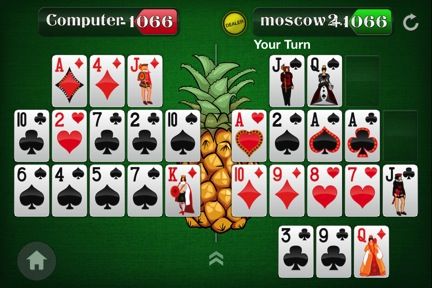
The computer fouls and we catch a queen to go to Fantasyland. How good are we running?!
1. /10?2?/6?4?5?, J?/A?2?/10?9?
2. /10?2?(7?)/6?4?5?(7?)/[?], J?/A?2?/10?9?(7?8?)/8?
3. (A?)/10?2?7?(2?)/6?4?5?7?/[?], J?/A?2?(A?)/10?9?7?8?(J?)/9?
4. A?(4?)/10?2?7?2?(10?)/6?4?5?7?/[?], J?(Q?)/A?2?A?(A?)/10?9?7?8?J?/3?
5. A?4?(J?)/10?2?7?2?10?/6?4?5?7?(K?)/[?] FOUL, J?Q?(Q?)/A?2?A?A?(9?)/10?9?7?8?J?/3?
It��s also worth noting that our sneaky spade-discarding almost certainly won us +9 points. The computer had a 10?, and could have played it on the bottom for a flush two rounds ago. It was a close call with only five spades left in the deck, but with the 3? and 8? completing a straight flush, and the 10? making him two pair in the middle, it looked like the right play from his perspective.
In fact, only three spades were left, and only one card for the straight flush. If the computer had had that information, he��d have been better off taking the safe +4 on the bottom by completing the flush.
Instead, we scoop for +17 points, plus Fantasyland. This game is easy!
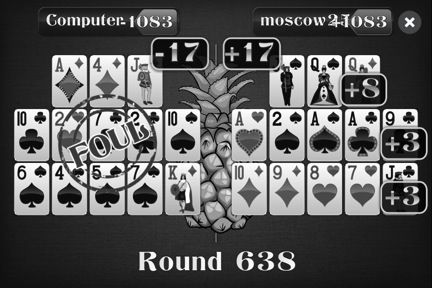
Round 639 (first to act, in Fantasyland) �C Not again��
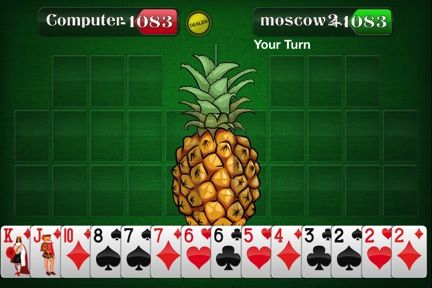
Pretty easy to see there��s a diamond flush here and an extra flush card. At least flush and trips��
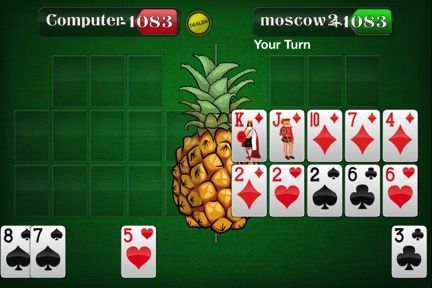
Actually, we��ve got a full house on the bottom.
So what if our top sucks? We can get a six-point bonus on the bottom and an eight-point bonus in the middle. Yeah, our top will lose, but what if the computer fouls? And besides, a scoop is worth +3, or rather the difference between winning and scooping is +5. Our middle is worth more that. Take the points.
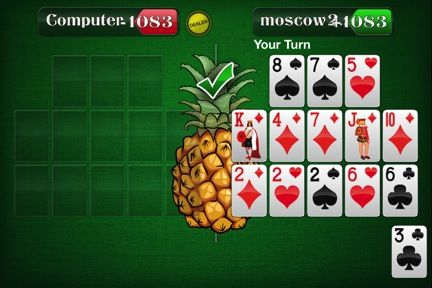
1. 8?7?5?/K?4?7?J?10?/2?2?2?6?6?/3?, Q?/K?A?/J?J?
2. 8?7?5?/K?4?7?J?10?/2?2?2?6?6?, Q?/K?A?(10?)/J?J?(8?)/[?]
The silicon nemesis wastes no time in scaling the walls of our Fantasy-castle. Is his queen on top 100% live? Sure it is.
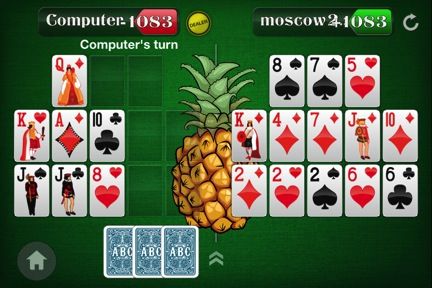
There goes the scoop��
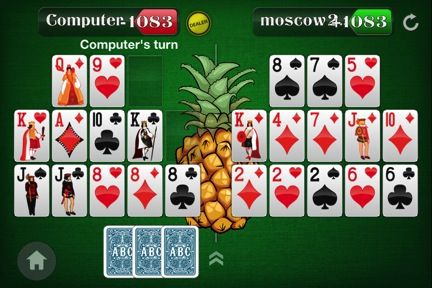
��but he somehow miraculously manages to miss any of the three live queens. We even win a few points. Definitely feels like a win after how our opponent started the hand.
1. 8?7?5?/K?4?7?J?10?/2?2?2?6?6?/3?, Q?/K?A?/J?J?
2. 8?7?5?/K?4?7?J?10?/2?2?2?6?6?, Q?/K?A?(10?)/J?J?(8?)/[?]
3. 8?7?5?/K?4?7?J?10?/2?2?2?6?6?, Q?/K?A?10?(K?)/J?J?8?(8?)/[?]
4. 8?7?5?/K?4?7?J?10?/2?2?2?6?6?, Q?(9?)/K?A?10?K?/J?J?8?8?(8?)/[?]
5. 8?7?5?/K?4?7?J?10?/2?2?2?6?6?, Q?9?(3?)/K?A?10?K?(A?)/J?J?8?8?8?/[?]
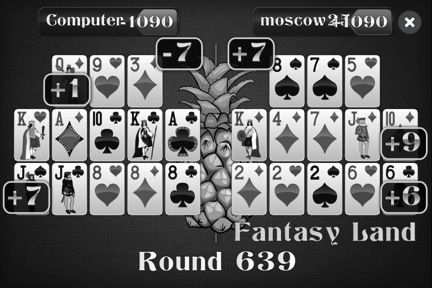
Round 640 (button) �C Can��t have it both ways
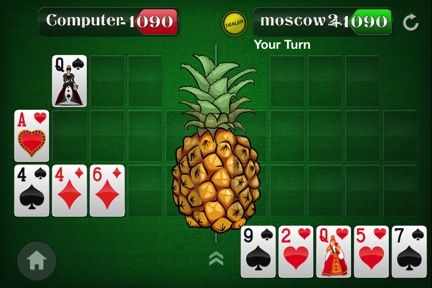
It��s easy to reflexively play the queen on top, put the two-card straight flush on the bottom, and go for a pyramid. But that won��t be my play here.
Instead, I go for the bottom flush. With only one heart out, the flush is very likely to come in, and as usual, I could back off and go for two pair or trips as needed.
With one queen dead, my Fantasyland chances are greatly reduced, while with my opponent going for aces in the middle, he is likely to make two pair or trips on the bottom, so my bottom flush is a good bet for +4 plus the win.
1. Q?/A?/4?4?6?, /7?9?/Q?2?5?
2. Q?/A?(A?)/4?4?6?(10?)/[?], (K?)/7?9?/Q?2?5?(J?)/(2?)
And immediately, my play turns out to be correct. The computer makes a good play to pair its ace, and to play a live card on the bottom. Why hold out for a bottom full house when what he really wants is two pair, and a shot at Fantasyland.
Unless I get unlucky, I should now win the bottom with a flush, and my king on top takes the lead there �� at least temporarily.
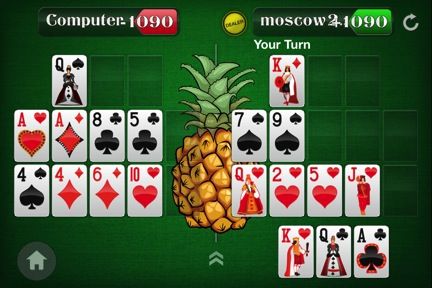
1. Q?/A?/4?4?6?, /7?9?/Q?2?5?
2. Q?/A?(A?)/4?4?6?(10?)/[?], (K?)/7?9?/Q?2?5?(J?)/(2?)
3. Q?/A?A?(8?5?)/4?4?6?10?/[?], K?(Q?)/7?9?/Q?2?5?J?(K?)/(A?)
There is no chance I��m gambling by not taking the flush in hand for a KxKx on top and a Fantasyland in the bush. My opponent is fouling. Better to take the sure win and close to 0% chance of a foul, and it��s not like I can��t catch the king or queen later in the hand anyway.
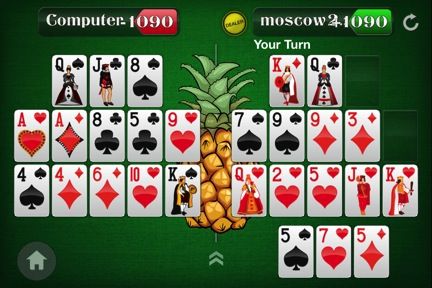
As good as I��m running, and as bad at the computer ran to foul his hand, I didn��t make Fantasyland. So it��s only worth +10 for the scoop with a bottom flush.
1. Q?/A?/4?4?6?, /7?9?/Q?2?5?
2. Q?/A?(A?)/4?4?6?(10?)/[?], (K?)/7?9?/Q?2?5?(J?)/(2?)
3. Q?/A?A?(8?5?)/4?4?6?10?/[?], K?(Q?)/7?9?/Q?2?5?J?(K?)/(A?)
4. Q?(J?)/A?A?8?5?(9?)/4?4?6?10?/[?], K?Q?/7?9?(9?3?)/Q?2?5?J?K?/6?
5. Q?J?(8?)/A?A?8?5?9?/4?4?6?10?(K?)/[?] FOUL, K?Q?(5?)/7?9?9?3?(7?)/Q?2?5?J?K?/5?
Given how many hearts the computer caught, there wasn��t a way to both make the flush, and to qualify for Fantasyland.
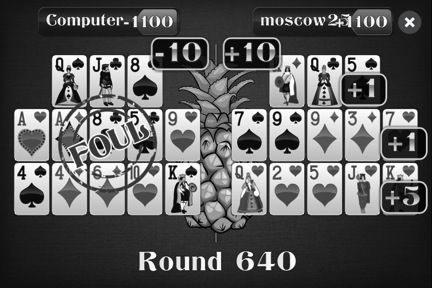
Summary Thus Far
After six hands, we��ve won +35 points, having gone to Fantasyland twice, and defended against Fantasyland once. Not bad, as we��ve won over five points per round, and haven��t fouled yet.
But also not that impressive, as we��ve run amazingly well, yet not managed to pick up any monster rounds. It��s only a short stretch of a long match, and as the OFC John Paul Jones would have said, ��I have not yet begun to fight!��
Check back on Tuesday for even more great Pineapple OFC strategy as Yakovenko's match continues.
Get all the latest PokerNews updates on your social media outlets. Follow us on Twitter and find us both Facebook and Google+!




